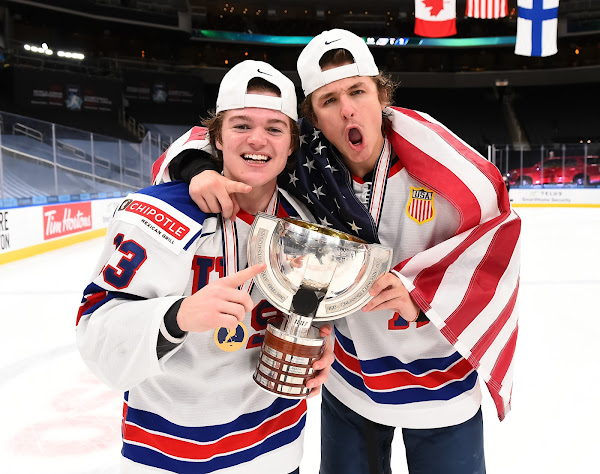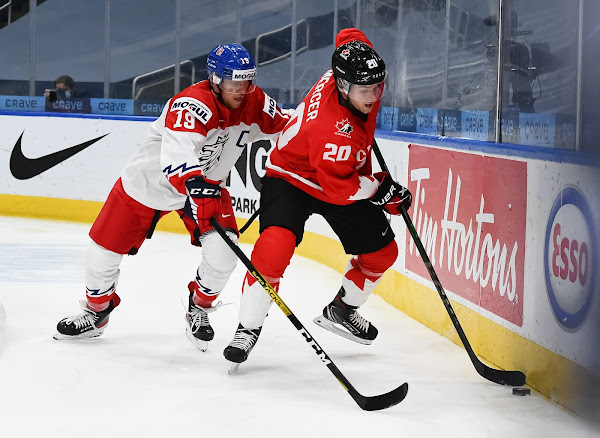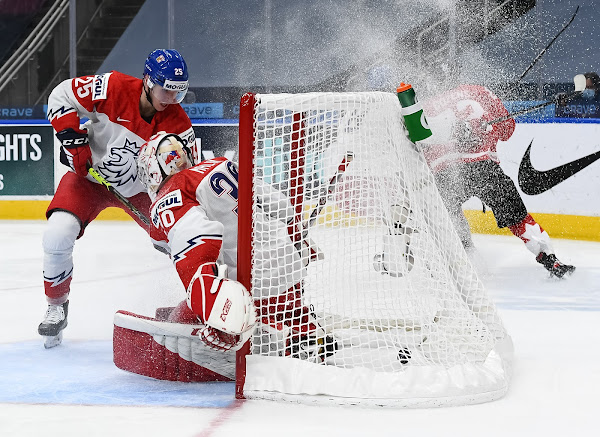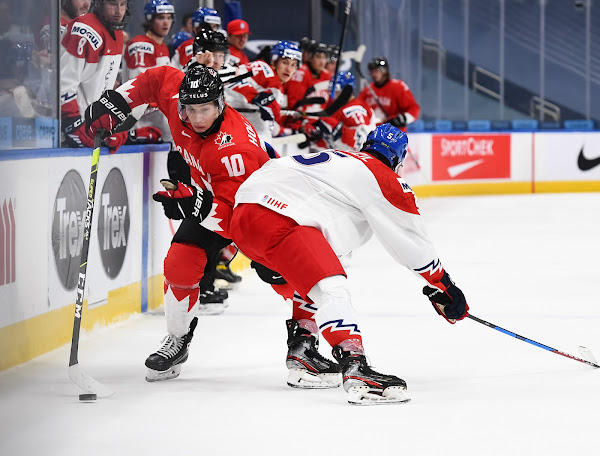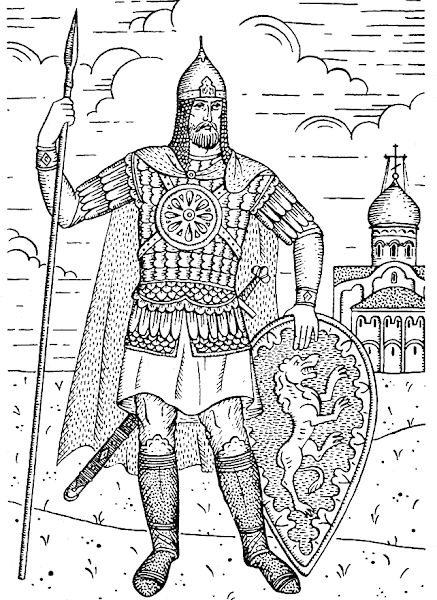Saturday, January 2, 2021
ENJOY 2021 IIHF World Junior Championship (Edmonton, CANADA)
With the end of the 2021 #WorldJuniors, it's time to start planning for 2022! See you back in Alberta!
The 2021 World Juniors are over but the 2022 IIHF World Junior Championship will return to Alberta.
Since the 2021 edition couldn’t be played in front of fans in Edmonton and Red Deer as initially planned but in a bubble without spectators in Edmonton due to the Covid-19 pandemic, the 2022 IIHF World Junior Championship will be played in Edmonton and Red Deer instead with the expectation that the situation at that time will allow to hold it with spectators.
The original announcement was made on 17 September 2020 following the approval by the IIHF Council.
It will be the 15th World Juniors to be hosted in Canada and will take place at the recently constructed Rogers Place, the home of the NHL’s Edmonton Oilers and Oil Kings of the Western Hockey League (WHL), and at the ENMAX Centrium, home of the WHL’s Red Deer Rebels.
With the gold medal game of the 2021 World Juniors over, the tentative groups of the 2022 IIHF World Junior Championship have become known.
Host Canada will play Finland, Germany, the Czech Republic and Austria in Edmonton. The group in Red Deer includes defending champion USA, Russia, Sweden, Slovakia and Switzerland.
The tournament will be played from 26 December 2021 to 5 January 2022. Following a six-day preliminary round until New Year’s Eve the event will continue with the quarter-finals, semi-finals, medal games and relegation games.
Fans who have purchased ticket packages for 2021 and didn’t request a refund will be able to retain the tickets for the 2022 IIHF World Junior Championship at no additional cost.
Fans who wish to be informed by Hockey Canada for future ticket opportunities for the 2022 World Juniors can sign up for the Fan List.
The game schedule for the 2022 IIHF World Junior Championship will be announced at a later date.
Following the next edition, the IIHF World Junior Championship will return to Europe in Novosibirsk, Russia in 2023 and in Gothenburg, Sweden in 2024.
As it has every game this tournament, Canada roared out to an early lead and never looked back. Tonight, Russia was the victim, and the 5-0 score was richly dserved by the more determined and aggressive Canadians.
The International Ice Hockey Federation has announced the winners of the individual awards and the tournament all-star team after the gold medal game of the 2021 IIHF World Junior Championship.
American forward Trevor Zegras was honoured as MVP and a tournament all-star team member. In his second World Juniors, the 19-year-old had 7 goals and 11 assists to win the scoring race.
Zegras, who got a goal and an assist in the 2-0 gold-medal win over Canada, equalled Jordan Schroeder’s all-time U.S. World Junior records of 20 assists and 27 points, which were set over the course of three tournaments.
IIHF Directorate Awards
Best Goaltender: Devon Levi, Canada
Best Defenceman: Topi Niemela, Finland
Best Forward: Tim Stutzle, Germany
Media All-Star Team & MVP
Goaltender: Devon Levi, Canada
Defenceman: Bowen Byram, Canada
Defenceman: Ville Heinola, Finland
Forward: Trevor Zegras, USA
Forward: Dylan Cozens, Canada
Forward: Tim Stutzle, Germany
Most Valuable Player: Trevor Zegras, USAIn a hard-fought semi-final, Arthur Kaliyev scored the winner with 1:16 left as the U.S. defeated Finland 4-3 on Monday to advance to the 2021 World Junior gold medal game against host Canada.
Kaliyev, set up by Alex Turcotte, fired a laser over Finnish goalie Kari Piiroinen's glove to give coach Nate Leaman's team the victory.
The Finns rallied from a two-goal second period deficit to make it 3-3 in the third, but couldn't pull off another sensational comeback like their 3-2 quarter-final win over Sweden. Finland will face Russia for the bronze medal.
Tuesday will mark the fifth Canada-U.S final in World Junior history (1997, 2004, 2010, 2017). Surprisingly, given Canada’s overall dominance at this tournament, the U.S. has won the last three gold-medal clashes.
This semi-final provided revenge for the Americans after two consecutive medal-round losses to Finland. The Finns edged the U.S. 3-2 in the 2019 gold medal game in Vancouver. Finland also won the 2020 quarter-final 1-0 in Trinec.
The fun started early and in the strangest way imaginable. Alex Newhook had a great opening shift, culminating with a quick shot in front after he picked up a loose puck to the side of the net that Zakhar Bardakov tried to bat out of harm’s way.
Newhook whipped a shot that went in and out so quickly even he didn’t realize it. Play continued for 30 seconds and then the official timekeeper blew his horn to stop play, a most unusual occurrence. The referees then reviewed the play and quickly ruled it a goal, the official time being 0:59.
“I actually had no idea it went in,” he acknowledged. “I thought it hit the crossbar, but when you get an early chance like that and put it away, it’s great for the team.”
The Canadians increased their lead midway through the period thanks to a great pass by Jacob Pelletier to Connor McMichael to the back side of the play. He fought off defenceman Yan Kuznetsov and snapped the puck into the open cage.
Canada’s sensational period continued with a third goal, this from Cole Perfetti during a four-minute power play. He came off the point and from the top of the circle wired a shot under the glove of Askarov to the far side at 15:05, and the Russians left the ice after 20 minutes in a state of shock.
Nothing changed after the intermission, and Canada’s incredible puck pressure led to its fourth goal at 4:09. This time Askarov lost his stick and whole he was trying to get it from Semyon Chistyakov the Canadians moved the puck around, setting up Braden Schneider. His shot beat the goalie to the glove side again.
The Russians finally got their first power play of the night late in the period and scored after some good puck movement, but no sooner was it in the net than Canada challenged the play for offside. After a lengthy review, it was clear the puck entered the Canadian zone ahead of the play, and the goal was cancelled.
Captain Dylan Cozens was awarded a penalty shot with 29.4 seconds remaining after a determined effort in centre ice created a breakaway, but he was slashed on the play from behind. Askarov made a nice right-toe save, though, keeping the score at 4-0.
Canada stifled every Russain attempt in the third period to rush the puck, pinch, create offence. The closest they came to getting back into the game was a his post off a drifting point shot by Shakir Mkhamadullin with about seven minutes remianing.
Cozens scored an empty netter at 18:31 to finish the scoring, his tournament-leading 8th.
With the 2021 IIHF World Junior quarter-finals looming, IIHF.com writers Lucas Aykroyd and Andrew Podnieks offer their insights and take some risks as they discuss the group stage and look ahead to what might unfold at Edmonton’s Rogers Place on Saturday.
What’s a key statistic that jumps out to you from the preliminary round?
LA: At the first World Juniors I covered in Vancouver in 2006, Canada set a record for fewest goals allowed (6), winning its second straight gold medal under coach Brent Sutter. This year, through the preliminary round, the Canadians have allowed just 4 goals. Is it a long shot that they’ll equal or beat the 2006 record? Yes. But it’s certainly not impossible.
AP: Germany is 8-for-21 on the power play. That’s the most goals of any team and the second-most advantages. Those are pretty impressive numbers, considering they played three of four games with 14 skaters. But it also shows their best players on paper have been their best players on ice.
For you, what is the feel-good story of the tournament so far?
AP: Happily, there are many. Trevor Zegras becoming a goal-scorer. Devon Levi coming from obscurity to be Canada’s number-one goalie. But surely the top feel-good story is the incredible play of Austrian goalie Sebastian Wraneschitz. He faced a ton of rubber, always with a smile on his face, and made countless fantastic saves.
LA: Losing 16-2 to Canada doesn’t generally bode well for your quarter-final hopes. And yet, the shortstaffed Germans came third in Group A. Wunderbar!
Speaking of Germany, could the Cinderella slipper fit?
LA: Tim Stutzle and John Peterka have put on a marvelous show in Edmonton. With a depleted German roster through the preliminary round, they’ve also both averaged more than 25 minutes a game, which bodes well for their next VO2 Max testing. That said, Russia, their next opponent, has only lost four quarter-finals since the IIHF instituted the playoff format in 1996. And only one of those games – where Nino Niederreiter scored the late equalizer and sudden-death winner in Regina as Switzerland beat Russia 3-2 in 2010 – was a true upset. Could the Germans make it hard on Russia with their work ethic? Sure. The Russians make it hard on themselves sometimes in quarter-finals. But Igor Larionov’s boys should come away victorious.
AP: Germany’s had a really nice run, but Russia? Seriously? It would make for a great story, but it’s probably not happening. But, hey, if the senior team can come within a minute of Olympic gold against Russia, maybe the juniors can pull of a miracle in Edmonton.
Tim Stutzle and John Peterka have been a dynamic duo for Germany.
PHOTO: MATT ZAMBONIN / HHOF-IIHF IMAGES
Which player from a European club has been the most impressive?
LA: It has to be Stutzle, who last played for Adler Mannheim and will soon suit up for the Ottawa Senators. The way he cut to the net for Germany’s 2-0 goal against Switzerland was reminiscent of a young Pavel Bure. He exudes energy, enthusiasm, and professionalism. I spoke with Mannheim goalie Dennis Endras, the 2010 IIHF World Championship MVP, back in May, and he singled Stutzle out for praise.
AP: I’m going to go a little off the beaten track here and say Florian Elias. The German forward is only 18 but has really shown he can keep up with Peterka and Stutzle and has the skill to lead the team next year to better things.
Which World Junior players in Edmonton look the most NHL-ready to you?
LA: Besides Stutzle, I’ve really been impressed with the focus and hard work of Canada’s Dylan Cozens and Finland’s Anton Lundell. Russia’s Vasili Podkolzin and the U.S.’s Trevor Zegras look ready to play in the NHL as well. But there will be an adjustment period for all these kids. It’s not like 2005, when you knew Sidney Crosby and Alexander Ovechkin would be stars from Day One.
AP: There’s no doubt several of Canada’s players could—and maybe in a few weeks will—step into the NHL. Dylan Cozens, Bowen Byram, Quinton Byfield. They all have the physical maturity and skill. Ditto for the two Swedes, Alexander Holtz and Lucas Raymond. Cam York has also been impressive in an “NHL here I come” sort of way for the U.S..
Which quarter-final team’s goaltending has impressed you the most and why?
LA: As Andrew mentioned, Canada’s Devon Levi seemingly came out of nowhere to take over the number one job. So far, the 19-year-old Montreal native has done an excellent job of emulating what his childhood idol, Carey Price, did at the 2014 Sochi Olympics. He’s made the necessary saves and stayed cool, calm and collected – while being very well-protected. Levi, who starred last season for the Junior Carleton Place Canadians and has yet to make his Northeastern University debut, reportedly spends three and a half hours preparing before each game. It’s paid off in Edmonton with a 0.82 GAA and 95.0 save percentage.
AP: So many interesting angles here (pun intended). Simon Latkoczy has been great for the Slovaks and Florian Bugl very solid for the Germans since coming back. Levi has been solid and Finland’s Kari Piiroinen also terrific. Spencer Knight had a bad first game but showed tremendous character in bouncing back and recording two shutouts since. More important than any great save is the fact these goalies haven’t given up a bad goal, one where the team’s bench sags in knowing defeat.
Goalie Devon Levi is looking to make a name for himself at the Juniors.
PHOTO: ANDREA CARDIN / HHOF-IIHF IMAGES
Are we going to see an upset in the quarter-finals?
AP: No. And, no. Russia, Canada, and the U.S. are in, and whoever wins the Finland-Sweden game surely won’t be considered an upset.
LA: That depends on whether Tomas Tatar and Jaroslav Janus have altered the space-time continuum and will suit up for Slovakia, as they did in the 5-3 upset of the Americans in Ottawa in 2009. If not, I’m saying no.
The MVP watch continues. Who needs to be the key player to propel their team to a medal?
AP: I’ll focus on the four teams I think will win the quarters. For Canada, I think their offense starts at the back end, so I’m saying as Bowen Byram goes, so goes the team. For Russia, the Leafs fan in me wants to see Rodion Amirov step up even more. The Americans are clearly Trevor Zegras’s team, and for Sweden it’s Lucas Raymond. In each case, the team’s goalie needs to play well and not mess up, but there is so much talent in front of them they don’t need to be sensational.
LA: Same focus for me. For the mercurial Russians, I suspect that Yaroslav Askarov will need to steal a game at some point in the medal round before his teammates’ skill wins out. And who knows? Maybe that means stoning Tim Stutzle on three breakaways. I understand why Canada wanted to keep Kirby Dach as their captain out of respect, but Dylan Cozens has emerged as a huge leader for this team with both his attitude and his execution, and to me, he could be wearing the “C” every game. For the U.S., Trevor Zegras is making up for the absence of Jack Hughes in spades. And either Raymond or Alexander Holtz has to start producing for Sweden to come through in the crunch.
Sweden will be countind on veteran forward Lucas Raymond to lead them to gold.
PHOTO: MATT ZAMBONIN / HHOF-IIHF IMAGES
Time to go out on a limb! What will be the final score in each of our 2021 quarter-finals?
AP: Ugh, you can’t win here! Choose correctly and people will say you’re lucky. Mess up, and everyone laughs. Okay, here we go: Russia 4, Germany 2. Sweden 4, Finland 3. Canada 6, Czech Republic 1. U.S. 4, Slovakia 1.
LA: Russia 5, Germany 2. Sweden 4, Finland 3 (in OT). Canada 6, Czech Republic 1. U.S. 8, Slovakia 2.
With patience, skill, and a balanced attack, the Americans defeated gutsy Slovakia 5-2 in Saturday's last quarter-final at Edmonton's Rogers Place. The U.S. will take on Finland in the semi-finals on Monday, while host Canada battles Russia.
John Farinacci stepped up with two goals, and Arthur Kaliyev, Cole Caufield, and Matthew Beniers also scored for the Americans. Tournament scoring leader Trevor Zegras and Bobby Brink each chipped in a pair of assists.
U.S. coach Nate Leaman's team set a World Junior record with a shutout streak of 218:53. It ended when Slovakia's Matej Kaslik scored late in the second period. The last goal the Americans had surrendered was Yegor Chinakhov’s empty-netter with 21 seconds left in the 5-3 opening loss to Russia.
Dominik Sojka had the other goal for Slovakia, which finished eighth for the third straight year.
It was a goaltending duel between American starter Spencer Knight and Slovakia's Simon Latkoczky, who kept his team in it as shots favored the U.S. 43-18. Slovak coach Robert Petrovicky opted for the 18-year-old World Junior rookie Latkoczy, who entered with a 1.94 GAA and 93.3 save percentage, over three-time tournament participant Samuel Hlavaj.
With four all-time gold medals (2004, 2010, 2013, 2017), the Americans now have their sights set on another title. They have a history with their semi-final opponent. They lost the 2019 final to Finland and finished fifth last year with a quarter-final loss to the Finns.
Meanwhile, the Slovaks have a total of two bronze medals (1999, 2015) in World Junior history.
The Americans came in dominating on special teams, with their power play clicking at 40 percent (6-for-15) and their penalty kill functioning perfectly (0 goals allowed on 5 disadvantages). Their discipline wasn’t as impeccable against Slovakia, but they still found a way to prevail.
After killing off an early Slovak man advantage, the U.S. made it 1-0 on the power play at 10:44 with precision puck movement. From the goal line, Matthew Boldy found Kaliyev cross-crease with a no-look pass. It was the second goal of the tournament for the longtime star of the OHL’s Hamilton Bulldogs.
Late in the first, Zegras looked shaken up on an open-ice hit by Slovakia's Oliver Turan, a 196-cm, 96-kg defenceman. However, the future Anaheim Ducks forward was right back out there to start the second period.
Early in the middle frame, Caufield, who turned 20 on Saturday, was denied by Latkoczy on a breakaway and couldn't convert his rebound. A few minutes later, the Slovak goalie was equal to the challenge when Alex Turcotte broke in alone.
Even though the Slovaks strove to slow the pace, patience paid off for the Americans. Ryan Johnson's wrist shot from the left point deflected off Farinacci at 11:55 to make it 2-0.
With 3:07 left in the middle frame, Caufield got his birthday present with a 5-on-3 man advantage, as he rifled a shot bar down for a 3-0 lead and his second goal of the tournament. Caufield, a top Montreal Canadiens prospect who was named the Big Ten Freshman of the Year with the University of Wisconsin last year, tied Alexander Ovechkin's single-tournament U18 Worlds goal record (14) in 2019.
Kaslik finally got Slovakia on the board at 18:32, hammering home a slap shot after a U.S. defensive breakdown in the high slot.
In the third period, Sojka scored the first power-play goal the U.S. penalty-killers have allowed in Edmonton, tipping in captain Samuel Knazko's left point shot at 9:50.
However, that was as close as the underdog Slovaks would get. Farinacci stepped out from behind Latkoczy's cage and scored on a backhanded wraparound at 15:46 to restore the U.S.'s two-goal gap.
Petrovicky pulled Latkoczky for the extra attacker, but Beniers scored an empty-netter with 1:24 remaining to seal the 5-2 victory.
This game was a revenge of sorts for Leaman. At his last World Juniors in 2009 in Ottawa, he was an assistant to Ron Rolston when Slovakia eliminated the U.S. with a 5-3 quarter-final upset. That was the only previous quarter-final meeting between these nations.
All that matters now for America, though, is winning Monday's semi-final against the never-say-die Finns, who rallied to defeat Sweden 3-2 in their quarter-final.
Дорогие друзья!
С наступающим Новым годом Вас!! Пусть будет всё у вас хорошо!!!
И в подарок вам как символ мужества и борьбы для болельщиков и участников матча КАНАДА - РОССИЯ этот специальный виртуальный концерт.
Dear Friends,
This is a performance for CANADA - RUSSIA in 2021 IIHF World Junior Championship in Edmonton, Canada participances and funs hockey game from members of the Alberta Interscience Association, Canada:
Presentation of Santa and the performances of our school kids:
"Trus ne igraet v khokkey" in Russian: Трус не игра́ет в хокке́й:
Звенит в ушах лихая музыка атаки,
Точней отдай на клюшку пас, сильней ударь!
И всё в порядке, если только на площадке
Великолепная пятёрка и вратарь!
Припев:
Суровый бой ведёт ледовая дружина:
Мы верим мужеству отчаянных парней.
В хоккей играют настоящие мужчины,
Трус не играет в хоккей!
Трус не играет в хоккей!
Пусть за воротами противника всё чаще
Победной молнией пульсирует фонарь!
Но если надо, защищается блестяще
Великолепная пятёрка и вратарь!
Припев:
Суровый бой ведёт ледовая дружина:
Мы верим мужеству отчаянных парней.
В хоккей играют настоящие мужчины,
Трус не играет в хоккей!
Трус не играет в хоккей!
Красивых матчей будет сыграно немало,
И не забудем, не забудем мы, как встарь,
В сраженьях золото и кубки добывала
Великолепная пятёрка и вратарь!
Припев:
Суровый бой ведёт ледовая дружина:
Мы верим мужеству отчаянных парней.
В хоккей играют настоящие мужчины,
Трус не играет в хоккей!
Трус не играет в хоккей!
"Trus ne igraet v khokkey" (Russian: Трус не игра́ет в хокке́й. The coward does not play hockey) could be called the anthem of ice hockey in Russia. The song was composed in 1968 by Aleksandra Pakhmutova (music), Sergei Grebennikov and Nikolai Dobronravov (lyrics - both). During this period of Soviet history, ice hockey was very popular in USSR. Since then, it has been performed by many musicians - and most hockey arenas in Russia use its theme to open the game.
Трус не играет в хоккей (караоке)
Baryna. Matreshka Russian Dance Group. Edmonton, AB
From
КАТЯ УДОД исполняет песню Юрия Визбора "Милая моя".
From
For Russian Cosmonaut Sergey Kud-Sverchkov
Performance of musical classes
From
Kalinka. Matreshka Russian Dance Group. Edmonton, AB
From
Edmonton Heritage Festival -5. Russian Men's Dance.
From
From Edmonton Heritage Fest 2017 -32
From
Medley. Matreshka Russian Dance Group. Edmonton, AB
From
It is a waltz!!!
From
Russian pavilion at Edmonton Heritage Fest 2017 -33
From
Subscribe to:
Comments (Atom)





















